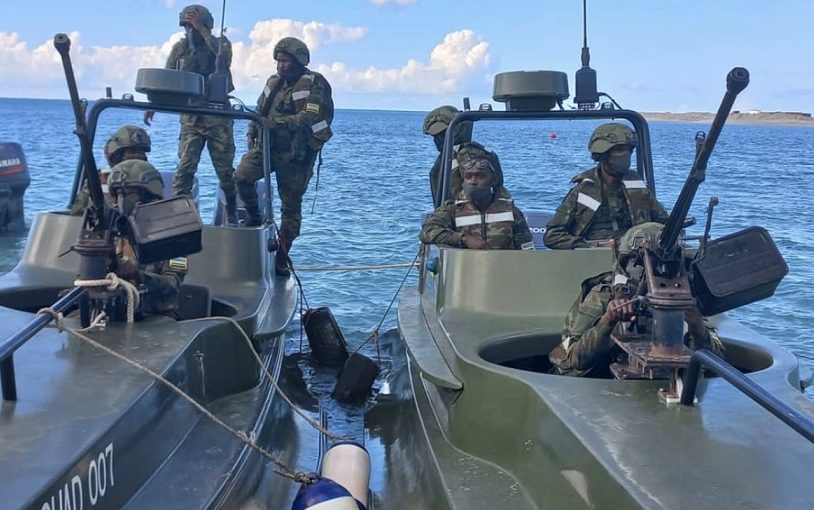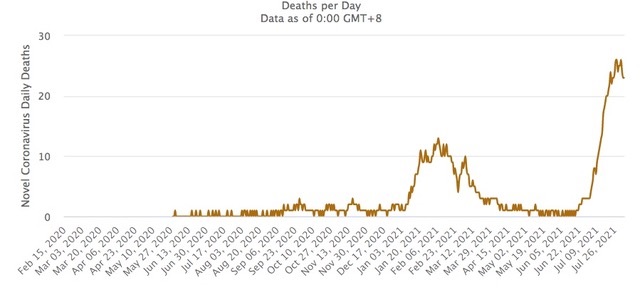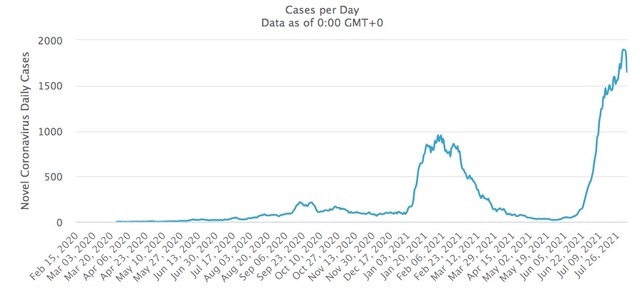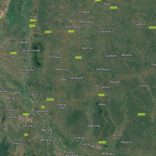Mozambique: Man arrested for ATM fraud - Notícias
Mozambique: Covid-19 peak? Mocimboa under attack, Chissano calls for negotiation – By Joseph Hanlon

Photo: Twitter / @militaryafrica
In this issue
Covid-19
+ Finally peaked?
Cabo Delgado
+ Mocimboa da Praia encircled
+ Foreign troops arriving in force
+ Lessons from Afghanistan?
+ Chissano: negotiate & look to causes
+ Portuguese foreign minister: cause is IS, not poverty
Other news
- Has Covid-19 peaked at 25 death per day?
Did Covid-19 peak at 1900 new cases and 25 deaths on Sunday (2 August). Early this week, numbers dropped slightly, after very rapid rises since mid-June.
Reports are erratic. On 5 days in July, newly reported cases exceeded 2000, but the next days reported cases were much lower. Thus, the most accurate number is the “7-day moving average” – that is, the average of the previous 7 days. This average peaked near 1900 new cases and 25 deaths per day on 1-3 August, but had dropped to 1650 new cases and 23 deaths on Wednesday 4 August.
The best available data for regional distribution is of active cases, of which 78% are in Maputo city and province, 6% in Inhambane, 4% in Niassa, 3.5% in Sofala, and 3.0% in Mania. Of the 1434 deaths up to the end of July, 1025 were in Maputo city, followed by 141 in Maputo province, 60 in Sofala, and 46 in Tete.
Graphs below from Worldometers show 7 day moving average of daily deaths and new cases, up to an including 4 August..
Cabo Delgado
- Mocimboa da Praia encircled
Rwandan and Mozambican forces have surrounded Mocimboa da Praia, which has been held by insurgents for the past year. This is the largest town in the war zone, with the only port on the northern Cabo Delgado coast, and an airstrip.
Road and sea access to the town have been cut off, military sources claim. The two forces have recaptured five insurgent-held villages near Mocimboa, and hold key positions around the town. (MediaFax 5 Aug, VoA 4 Aug, Lusa 3 Aug). Pinnacle News (3 Aug) reports Rwandan and Mozambican forces moving east on the N380 road from Awasse, captured from insurgents two weeks ago. Smaller insurgent camps have been captured and aerial bombardment is reported by Pinnacle. Thus an attack on Mocimboa seems imminent.
In response to attacks by better trained and equipped Rwandan troops, the insurgents have followed the standard guerrilla tactics and abandoned large bases and split into smaller groups. The groups have attacked villages in Muidumbe, Nangade, Mocímboa da Praia, Palma and Macomia districts. (MediaFax 28 July)
The Rwanda Defence Force did a very good televised briefing on 29 July on its first week in battle on Mozambique. Rwanda claims no casualties so far, while Rhula (30 July) says “sources agree that the Rwandan forces have already sustained considerable casualties.” CaboLigado (3 Aug) reports “that flights left Afungi for Kigali on 25 and 26 July carrying Rwandan casualties from fighting near Awasse.”
- Foreign troops are now arriving in force
Troops from South Africa, Botswana and Tanzania are already in Mozambique as part of the SADC force. Mozambique wanted the Rwandan troops in action first, and the SADC force only began arriving last week.
On 1 August SAS Makhanda, a Warrior-class strike craft of the South African Navy, currently configured as an Offshore Patrol Vessel, arrived in Pemba Port. A squadron of South African Rooivalk attack helicopters was reported in Pemba on 3 August. An Air Force Cessna Caravan light aircraft arrived in Pemba and will presumably be used for aerial reconnaissance.
The first contingent of armoured vehicles from special forces 43 Brigade was visible as it moved through the border post of Ressano Garcia at Komatipoort at first light on 1 August. The convoy contained the first of South Africa’s mechanised infantry battalion vehicles. Two South African Air Force Hercules C130 cargo aircraft have been flying regular flights between Waterkloof Air Force Base in Pretoria and Pemba in the past two weeks transporting soldiers, equipment, ammunition and a contingent of Special Forces. South African has authorized the deployment of up to 1,495 troops. (Mail & Guardian 2 Aug).
Without announcement, a Tanzanian military aircraft was seen in Pemba airport for several trips on 1-3 August. The Soviet era Yak-8 was unloading Tanzanian troops and military equipment. President of Tanzania Samia Suluhu Hassan visited Rwanda on 4-5 August, and the deployment of troops from both countries to Cabo Delgado is believed to have been one of the topics on the agenda of meetings with Paul Kagame.
On 26 July, Botswana’s first contingent of 296 soldiers flew to Mozambique. A long convoy of armoured assault vehicles and other support trucks were seen on 30 July as it crossed the border between Zimbabwe and Mozambique at Gondola.
Angola has authorized a 20-person deployment along with a transport plane. Zimbabwe will send 303 military instructors to train Mozambican forces. This is in addition to Zimbabwean training efforts already ongoing in Mozambique.
- Comment: Lessons from Afghanistan
As troops pour in to Mozambique, troops pull out of Afghanistan after two decades of failed intervention. This excerpt comes from an Observer (1 August) article by Dan Jarvis who fought in Afghanistan as a British army major, and is now a member of the British parliament. The similarities to Mozambique should be a warning:
“I saw first hand what corruption did to the Afghan security forces and to the political environment under which they operated. Political exclusion and impunity were rife and undermined faith in a fledgling democracy. That, in turn, drove people towards the insurgency and further fuelled conflict.
“This was common knowledge but we did not tackle the underlying problems. Instead, we turned a blind eye to strongmen engaged in land grabs and murders, to a colossal bank fraud that threatened the entire economy and to widespread electoral fraud.
“Lasting stability is impossible to achieve if your security forces and government institutions are corrupt, your elected leaders are subordinated to warlords and swaths of the population feel excluded from power. We were complacent and involved in a long-running conspiracy of optimism that the tide would turn, but it never did. Then, on realising the consequence of our strategy, we opted for abandonment.”
- Chissano: negotiate and look to causes of war
Ex-President Joaquim Chissano (1986-2005) appealed to the government to consider negotiations with Cabo Delgado insurgents. And he stressed that the causes of armed violence must be studied to resolve the military and social crisis in the province. (DW, Lusa 4 Aug, citing Radio Mocambique interview).
As President, Chissano won praise by negotiating with Renamo to end the 1982-92 war – explicitly “talking to terrorists.” He is the first senior Frelimo figure to openly advocate negotiation in Cabo Delgado – and he can speak from the secure position of having negotiated the end to the previous war. But by calling for negotiations and especially looking at the roots of the insurgency, he is challenging the current president, Filipe Nyusi, who downplays local grievances and stresses a purely military solution.
Comment: Chissano clearly believes in negotiation. He is using his position to push for it and his intervention is genuine. But it is also part of the growing splits within Frelimo and the already hot competition for who will be the Frelimo candidate for president in 2024. The current president Filipe Nyusi would like to use a military win in Cabo Delgado to gain support to change the constitution to allow him to stand again. Chissano and Armando Guebuza (2005-15) both tried for another term and failed, and Frelimo has been quite strong on the two-term limit. Chissano is 81 years old and Guebuza 78, and they would probably not be selected as candidates, but are competing to be king-makers. And there is a growing group inside Frelimo not connected to the three presidents which is also vying for power. This fight for power will become ever more public over the coming year. jh
- Angry Portuguese foreign minister: Cabo Delgado enemy is IS, not poverty; no insurgents in civilian population
In questions for Foreign Minister Augusto Santos Silva in the Portuguese parliament on 23 July, Left Block MP Alexandra Vieira warned about the limitations of the exclusive focus on an armed intervention in Cabo Delgado. The roots of the armed conflict are complex, she said, noting that economic difficulties, the absence of the state support, and the depletion of natural resources are factors that feed the high internal recruitment by the insurgents among the local population.
“This cannot be allowed to pass in silence,” protested the minister. There is no question, he stressed, that this is “an attempt of penetration and contamination of all Southern Africa by the fundamentalist, Islamist logic linked to the so-called Islamic State”. For Santos Silva, there is no question of discontent and opposition to the actions of the Mozambican government and the squandering of natural resources in Cabo Delgado.
Augusto Santos Silva was categorical: “It is false that there are groups of insurgents among the civilian population. It is an insult to the liberation movements of the former Portuguese colonies, which had their roots in the civilian population, which were protected by the civilian population, to suggest that in Cabo Delgado what we have now is the opposition, which has the support of the civilian population and which opposes an oppressive government or other designations”. He added that he is well informed and in close contact with Mozambican president Filipe Nyusi. (Esquerda, 30 July)
Land grab confirmed. Speaking to displaced people in Ancuabe district two weeks ago, ADIN head Armindo Ngunga urged them to begin cultivating fields and building permanent houses because they are not returning to their communities of origin. (CaboLigado 3 Aug) ADIN is the Northern Integrated Development Agency and has a main responsibility to deal with the 800,000 displaced. Until he was appointed ADIN head, he was permanent secretary of Cabo Delgado, which means he has high Frelimo links. His statement confirms the policy to clear land in the war zone to offer to foreign mining and farming investors after the war.
Other news
Police attacked and injured two journalists in Catandica, Manica, who were covering a confrontation between police and street sellers on 23 July. The Catandica municipality had increased the taxes the street sellers from 15 US cents a day to $8 a month, and the street traders were refusing to pay. As well as being a huge increase, most street traders rarely have $8 at one time. The journalists work for Catandica Community Radio, and the attack has been condemned by Forcom, the community radio association, and by the Mozambique chapter of MISA (Media Institute of Southern Africa)
President Filipe Nyusi declared that the government is in a hurry to take schools, hospitals, electricity, roads and clean water to places where these facilities still do not exist. (AIM 31 July) That will come as a bit of a surprise after a very slow start. But it may be related to the growing discussion about the next presidential candidate. And like each prior president, Nyusi may have dreams of a third term, which would require a constitutional change. So far, Frelimo has always rejected any suggestion of a third term.
Dubai-based logistics giant DP World is strengthening its grip on logistics between Mozambique and its landlocked neighbours. It is buying J&J, a major player offering road transport along the Beira corridor, and South African company Imperial Logistics. DP World is already a key player in the Port of Maputo. It is one four shareholders in Maputo Port Development Company, which manages the port, and also holds the sub-concession to manage, develop and operate the Maputo container terminal. (Zitamar 30 July)
It is now setting up improved container movement from Maputo port inland. International container imports for South African can now be moved under bond to a terminal in Komatipoort, where full customs clearance can be provided. Last month, DP World started a container train service between Maputo and Harare, with DP World Maputo handling all port and border documentation.
This should speed up transit traffic and cut some of the corruption. Will it reduce smuggling of drugs and other goods in containers?
By the editor
Postal service closures show Mozambique is a star pupil of western capitalism, by Joseph Hanlon, Africa at LSE, blogs, 4 August 2021.
Collapsing Electoral Integrity in Mozambique, by Joseph Hanlon, Journal of African Elections, Volume 20 Number 1 June 2021.
By Joseph Hanlon















Leave a Reply
Be the First to Comment!
You must be logged in to post a comment.
You must be logged in to post a comment.